AI in Project Management Explained: Tools Driving 2025 Success
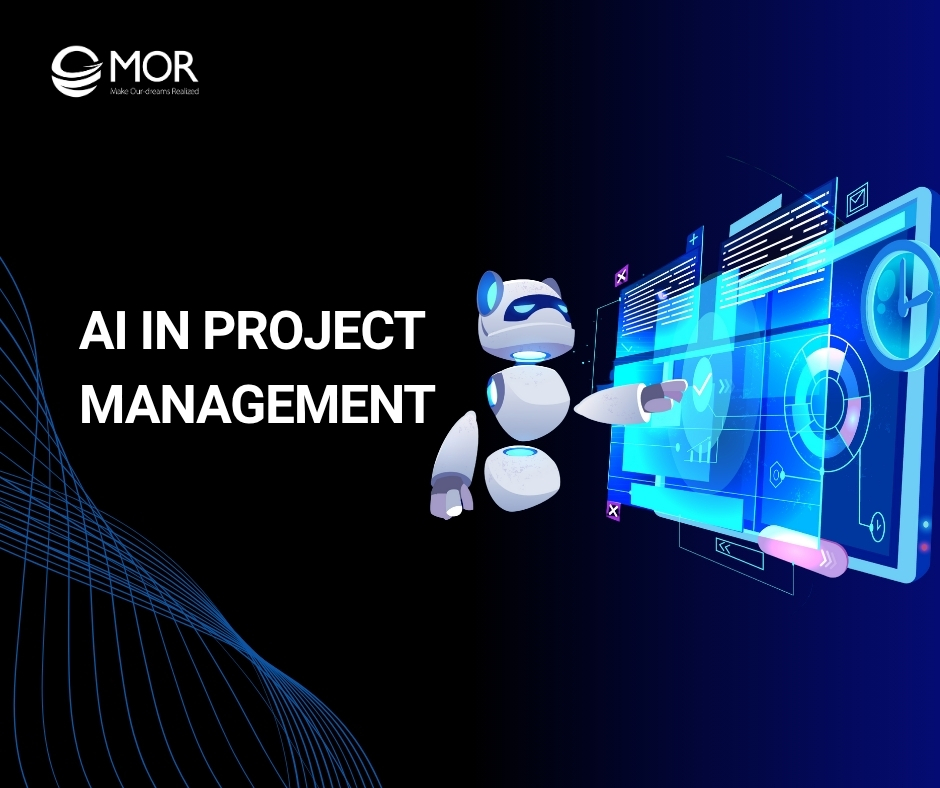
Traditional tools often struggle to keep up with today’s fast-moving projects. AI in project management is closing that gap with smarter automation and data-driven insight. This MOR Software’s guide will show how AI is transforming project planning, execution, and decision-making in 2026.
What Is AI In Project Management?
AI in project management refers to the application of artificial intelligence technologies like machine learning, natural language processing, and predictive analytics to enhance how projects are planned, executed, and monitored. Instead of replacing managers, AI acts as a digital co-pilot, handling repetitive or data-heavy tasks so teams can focus on strategic thinking and collaboration. This approach transforms traditional workflows, allowing leaders to manage projects faster, with higher accuracy and better insight.
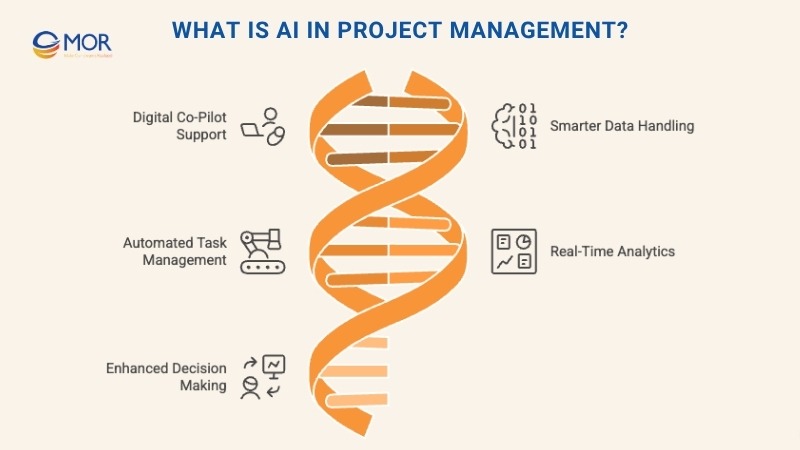
Project management itself spans the entire cycle, from planning and execution to monitoring, controlling, and closing. In this full life cycle, AI tools bring structure and precision to each phase, improving decisions through automation and real-time analytics.
- The APM Project Data Advisory Group highlights that one of the main strengths of AI in project management lies in its data-handling capacity. It can analyze large and complex datasets, identify patterns, and guide managers toward smarter, data-backed decisions.
- Rather than aiming to replace human judgment, AI is designed to support it. Intelligent automation eliminates repetitive manual work, freeing people to focus on creative problem-solving, leadership, and stakeholder communication.
- Many popular platforms already integrate AI features such as task prediction, performance forecasting, and sentiment analysis, and the technology continues to advance quickly across industries.
This evolution also aligns with the elements of AI, where algorithms, learning models, and decision systems work together to optimize planning, scheduling, and resource control. For teams exploring how to use AI in project management, it’s clear the goal isn’t just automation, it’s building a smarter, more responsive management process that scales with business needs.
As adoption grows, AI in project management continues to redefine efficiency, accuracy, and foresight in how organizations handle complex projects, marking a major shift in modern project delivery.
The Impact Of AI In Project Management Today
The rise of AI in project management has transformed how teams plan, communicate, and execute their work. It introduces smarter systems that learn from data, predict outcomes, and streamline collaboration. While the shift brings new challenges, its advantages across planning, delivery, and reporting are hard to ignore. Here’s how AI is reshaping modern workflows and redefining success in 2025.
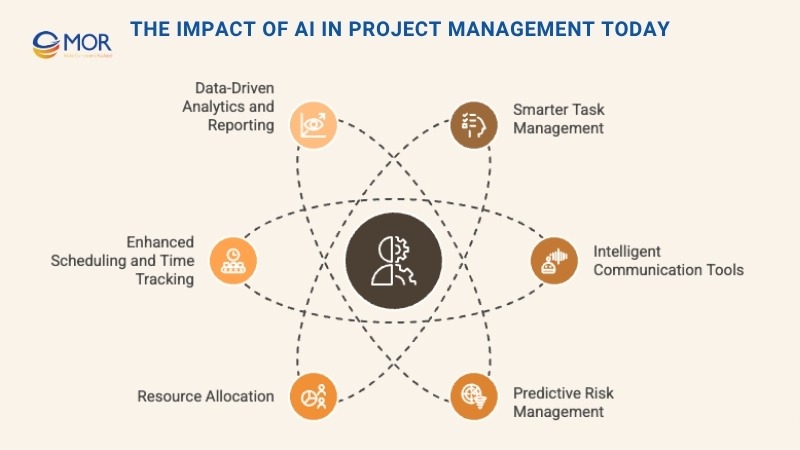
AI For Smarter Task Management
AI-powered platforms now take over complex project breakdowns, automatically turning broad goals into detailed, actionable tasks. They assign responsibilities based on team members’ strengths, availability, and previous performance. Over time, these systems adapt by analyzing past results, recommending smarter ways to complete work faster. This level of automation brings real improvement to how organizations are using AI in project management, helping teams hit deadlines with less manual effort.
Intelligent Communication Tools
Modern project management tools are also becoming intelligent communication centers. They can summarize meetings, translate team updates, and track follow-ups instantly. With AI’s language models, these systems detect unclear points or missing updates and nudge the right people to respond. In global teams, this capability strengthens alignment, reduces misunderstandings, and helps maintain consistent communication across time zones.
Predictive Risk Management
AI-driven systems now predict potential issues long before they occur. They analyze patterns in project data, external events, and past project results to calculate probability-based risks. As projects progress, these algorithms continue learning, refining predictions to deliver greater accuracy. This is one of the most practical examples of AI in project management, where predictive insight saves time, cost, and reputation.
AI In Resource Allocation
Resource planning has become more precise thanks to AI in project management tools that forecast workloads and simulate future demands. AI matches individual skill sets to the right tasks to make the best use of available talent. In industries like construction, AI in construction project management improves scheduling, minimizes idle time, and predicts labor or equipment shortages before they affect delivery.
AI-Enhanced Scheduling And Time Tracking
With AI-enhanced scheduling, projects no longer rely on static timelines. Intelligent software continuously adjusts schedules based on real-time progress, productivity trends, and dependencies. These systems can even alert managers before delays happen, keeping teams accountable. Over time, this helps organizations refine internal processes and understand where time is truly being spent, making performance reviews more data-driven and accurate.
Data-Driven Analytics And Reporting
Modern analytics powered by AI in project management go far beyond spreadsheets. They transform raw information into visual dashboards, trend charts, and predictive insights that support quick decision-making. This evolution helps businesses compare outcomes across projects and identify what works best. MOR Software has seen this first-hand in AI in project management case studies, where AI-generated reports have helped companies uncover inefficiencies and plan smarter for the next cycle.
Together, these developments show how artificial intelligence continues to move project management toward a more adaptive, data-centered future. Instead of managing tasks manually, organizations now manage intelligence, turning every project into an opportunity to learn and improve.
Key Types Of AI Project Management Tools In 2026
To understand AI in project management more clearly, it helps to look at the actual tools changing how teams work. These platforms vary in sophistication, some embed AI directly, while others connect with third-party systems for automation or analytics. Either way, each plays a distinct role in making project delivery faster, smarter, and more accurate.
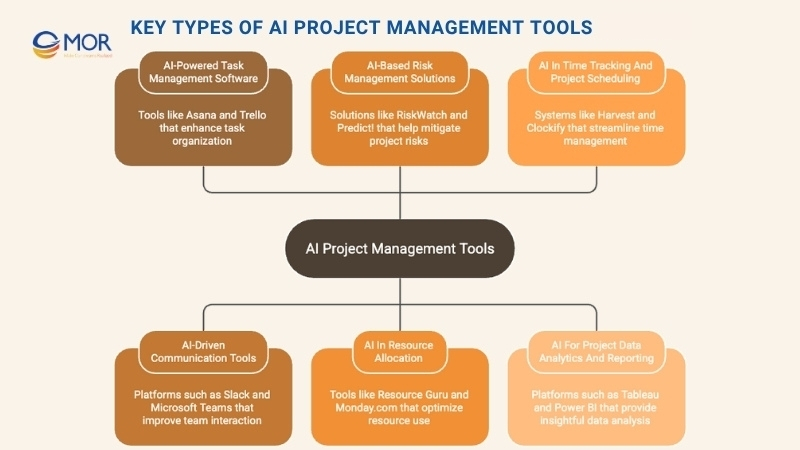
AI-Powered Task Management Software
AI-based project management tools for task management simplify how teams organize, track, and complete work. They automate routine actions like task creation, workload balancing, and progress tracking while learning from past projects to improve future performance. This shift allows managers to spend less time coordinating and more time leading.
Asana
Asana remains a standout example of AI in project management done right. Its AI features now extend across multiple stages of the project life cycle. The Smart Fields tool automatically generates relevant fields based on project details, while Smart Editor refines writing tone and clarity in updates or documentation. Asana also produces short summaries of complex task threads and suggests ways to clarify objectives, helping maintain consistency across projects.
Its automation engine, powered by machine learning, applies intelligent rules to standardize workflows and accelerate delivery. For teams exploring AI-driven project management, Asana demonstrates how structured automation can cut through noise, maintain visibility, and align everyone toward shared goals.
As of 2025, AI tools like Asana continue to evolve beyond simple automation, supporting the full AI project cycle diagram, from planning and scheduling to review and optimization, turning raw data into real, actionable progress.
Trello
Trello takes a visual-first approach to AI in project management, using boards, lists, and cards to simplify how teams plan and track work. Its latest AI updates, rolled out in early 2024, make project organization even smarter. The built-in Smart Editor helps refine task descriptions and communication for better clarity, while the Action Item Extractor scans discussions to pinpoint key follow-ups automatically.
Beyond automation, Trello’s AI also assists with brainstorming by generating ideas and suggesting structure for new projects, helping teams get started faster. Though these capabilities are currently available for Premium and Enterprise users, they mark an important shift in Trello’s evolution toward AI-based project management tools.
Trello blends its trademark visual layout with intelligent features to give project managers a more intuitive and guided way to manage workflows.
Sembly
Sembly is one of the most advanced tools using AI in project management to automate meeting follow-ups, documentation, and task creation. With its latest upgrade, Semblian 2.0, the platform functions like an intelligent assistant that listens, understands, and acts on your behalf. It automatically records meeting insights, updates knowledge bases, and creates structured artifacts such as project plans, RAID logs, and task lists, all aligned with what was discussed in your calls.
Compatible with Microsoft Teams, Google Meet, Zoom, and Webex, Sembly distills hours of meetings into concise, contextual summaries that sync directly with project management systems. Supporting over 40 languages and complying with GDPR and SOC 2 Type II standards, it ensures both global accessibility and enterprise-level security.
What sets Sembly apart from other AI-based project management tools is its ability to learn from every interaction. It recognizes your goals, project priorities, and communication style, then recommends next steps that align with ongoing progress. Through AI-driven project management, users can chat with Semblian 2.0 to revisit past meetings, uncover insights, and receive data-backed guidance.
Through automating documentation and reducing manual data entry, Sembly transforms meetings into actionable project intelligence, cutting time spent on admin tasks and giving teams more freedom to focus on execution and strategy.
AI-Driven Communication Tools
Effective collaboration depends on clear and timely communication, and this is where AI in project management is making a major difference. Modern communication platforms now use AI to transcribe meetings, summarize discussions, extract action points, and even recommend follow-ups automatically. These tools reduce time spent searching for updates or clarifying information, giving project teams more focus and continuity.
Slack
Slack has evolved from a simple chat tool into one of the most intelligent communication platforms for AI-driven project management. Its new AI features allow users to search conversations using natural language, receiving concise, context-based answers instead of scrolling through long threads. The system can also summarize discussions, highlight key decisions, and provide quick overviews of missed updates, perfect for keeping remote teams aligned.
Slack’s AI generates daily digests that capture essential messages, mentions, and actions from each workspace, ensuring no information slips through the cracks. It integrates seamlessly with third-party task systems and cloud tools, maintaining a secure, centralized space for collaboration. As companies explore AI-based project management tools, Slack remains a top choice for teams that value speed, clarity, and strong data protection.
Microsoft Teams
Microsoft Teams continues to expand its role in AI in project management, merging chat, video, file sharing, and app integration into one workspace. Its standout feature, Intelligent Recap, automatically transcribes meetings, identifies action items, and pinpoints crucial moments from discussions. Teams also supports real-time translation, allowing multilingual teams to collaborate without barriers.
The integration of Microsoft Copilot enhances productivity further, turning conversation data into summaries, message drafts, and task suggestions. This blend of automation and context-aware insight positions Teams as one of the most advanced collaboration tools in today’s AI project cycle. With direct links to Microsoft 365 apps, users can co-edit documents, track progress, and manage projects seamlessly, making Teams a cornerstone for efficient, connected workflows.
AI-Based Risk Management Solutions
In modern projects, anticipating problems before they happen is just as important as solving them. That’s where AI in project management plays a critical role. AI-powered risk management tools use predictive analytics and pattern recognition to identify potential threats, assess their impact, and recommend mitigation strategies long before issues escalate. These systems help organizations act proactively, strengthening both reliability and decision-making across teams.
RiskWatch
RiskWatch is an intelligent solution designed to simplify and automate the entire risk assessment process. It applies machine learning models to analyze complex data sets and reveal hidden patterns that could affect project outcomes. By delivering real-time insights, the platform helps managers understand risk exposure and prioritize actions effectively.
With customizable frameworks that adapt to industry standards, RiskWatch integrates smoothly into different project environments. Teams can assess, track, and communicate findings through a clean, intuitive dashboard. This aligns closely with the growing demand for generative AI in project management, where automated analytics continuously evolve with each new dataset, improving accuracy over time.
Predict!
Predict! by Risk Decisions takes proactive risk assessment further through advanced AI algorithms. The platform collects and interprets information from multiple data sources to forecast possible challenges and opportunities before they appear. Managers can create custom risk models tailored to their specific workflows, ensuring every project has a clear prevention plan.
Its real-time monitoring feature keeps an eye on project health throughout the lifecycle, sending alerts when deviations occur. Predict! demonstrates how predictive modeling supports the broader AI in project management market, empowering organizations to make faster, data-backed decisions and maintain stability even in dynamic environments.
AI In Resource Allocation
Smart allocation of people, time, and budget determines how efficiently projects run. With AI in project management, resource allocation has become more precise and data-driven. These tools analyze workloads, availability, and skill sets to assign the right person to the right task at the right moment. They also predict future resource needs, helping teams plan ahead and reduce downtime across projects.
Resource Guru
Resource Guru is a cloud-based scheduling tool designed to simplify how teams plan and manage resources. While the platform itself doesn’t include built-in AI, it integrates seamlessly with external systems like Bard AI through Appy Pie Automate to deliver intelligent scheduling. This setup allows teams to make smarter, data-backed decisions on staff utilization, equipment allocation, and overall capacity management.
Combining Resource Guru’s structured scheduling with AI insights, organizations can forecast demand more accurately and optimize usage across departments. It’s a practical solution for teams looking to integrate AI in project management without overhauling existing tools, blending automation with flexibility to improve daily operations.
Monday.com
Monday.com brings built-in intelligence to everyday project planning. Its AI engine automatically generates tasks based on project objectives and team inputs, saving managers from manual setup. The system uses machine learning to categorize work, summarize updates, and flag workload imbalances before they cause delays.
The Workload Dashboard helps leaders track team capacity in real time, preventing burnout and improving overall project health. With these capabilities, Monday.com exemplifies how AI in construction project management and other industries can transform traditional planning into an adaptive, data-driven process. It streamlines coordination, improves forecasting accuracy, and makes resource distribution more transparent across all project stages.
AI In Time Tracking And Project Scheduling
Accurate scheduling and time tracking are vital to keeping projects on course. With AI in project management, these tasks are becoming smarter and more predictive. AI tools can now recognize work patterns, forecast task durations, and automatically build optimized schedules. They also help balance workloads, anticipate bottlenecks, and maintain accountability without relying on constant manual input. Even when native AI features are limited, integration with third-party automation platforms adds significant value to traditional systems.
Harvest
Harvest remains a trusted tool for tracking project hours, expenses, and timelines. Its clean interface allows managers to log time, monitor budgets, and create invoices effortlessly. Although not a fully AI-powered system, Harvest connects with automation tools like IFTTT to streamline repetitive processes, helping teams save time on routine tracking.
The platform’s reporting capabilities stand out, it provides clear insights into profitability, performance trends, and individual productivity. When paired with AI-based project management tools, Harvest can deliver predictive visibility, showing how time investments align with project goals. This combination of simplicity and smart automation makes it a valuable foundation for improving time efficiency.
Clockify
Clockify takes time tracking a step further with automated activity logging. It records how much time team members spend on different apps and websites, creating precise, data-driven reports. These insights allow managers to understand productivity patterns across teams, clients, or projects.
While Clockify doesn’t yet include built-in AI, it supports integrations with automation and analytics tools that enhance its capabilities. Combined with advanced scheduling systems, it can predict availability, optimize shift planning, and improve overall coordination. This approach reflects how the AI project cycle increasingly includes intelligent time management as a key element of smarter, data-guided workflows.
AI For Project Data Analytics And Reporting
Analytics and reporting are the backbone of modern AI in project management. These tools transform raw project data into actionable insights by tracking KPIs, visualizing performance trends, and forecasting future outcomes. AI-driven reporting eliminates manual data processing, helping teams make faster and more confident decisions backed by real-time analytics.
Tableau
Tableau uses artificial intelligence to simplify project reporting and analytics for every skill level. Its generative AI capabilities automate data preparation and exploration, turning complex datasets into clear, interactive dashboards. The Einstein Copilot feature acts like an intelligent assistant, helping users generate visualizations, create calculated fields, and summarize project performance with just a few prompts.
Tableau Pulse adds another layer by delivering personalized insights in plain language, highlighting key metrics and trends tailored to each user. Project managers can now ask natural-language questions and get instant answers, no coding required. This blend of automation and clarity showcases how AI in project management case studies often rely on Tableau to make analytics more intuitive and collaborative.
Power BI
Power BI, Microsoft’s business analytics platform, also leads in AI in project management for data reporting. Its built-in AI features streamline how teams collect, process, and present information. The system’s AI assistant uses generative technology to help users design reports, interpret data, and surface hidden patterns quickly.
With support for natural language queries, Power BI lets anyone, from executives to project analysts, interact with data conversationally. Automated summaries and visual dashboards provide an instant overview of performance indicators, improving clarity across departments. Together with tools like Tableau, Power BI strengthens the AI flow chart within the broader AI project cycle, where insights move seamlessly from raw data to strategic decisions.
Benefits Of AI In Project Management
The growing adoption of AI in project management is transforming how teams plan, deliver, and assess projects. Beyond automation, AI gives leaders the ability to manage resources smarter, predict outcomes earlier, and scale faster. Below are the key advantages that show why this technology has become essential for modern project execution.
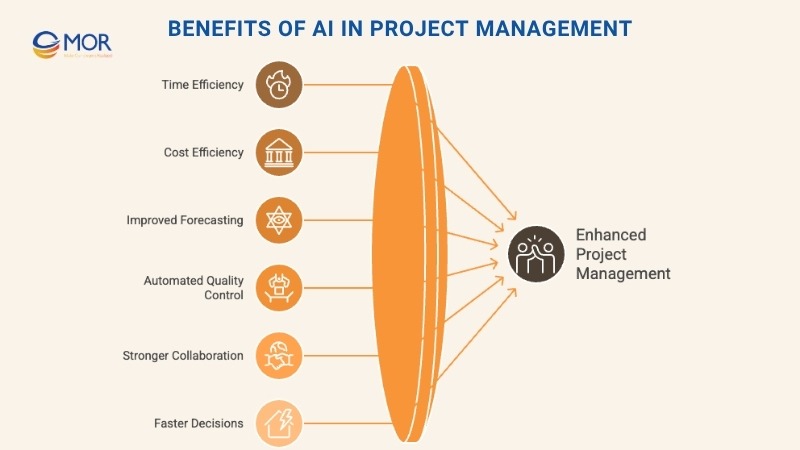
Time And Cost Efficiency
AI tools handle repetitive work like scheduling, reporting, and data entry automatically. This not only reduces human error but also saves countless hours once spent on manual updates. By simplifying these tasks, teams can direct more energy toward strategy, creativity, and stakeholder management. In the long run, this translates into measurable time and cost savings across every project.
Smarter Budget Oversight
With real-time monitoring, AI helps managers track spending and compare it against planned budgets. It spots anomalies instantly, highlighting areas where costs may be running too high. Eliminating waste and improving financial visibility, AI in project management keeps every dollar aligned with project goals.
Improved Forecasting
AI doesn’t just look at what’s happening now, it predicts what’s coming next. Drawing from historical data, it identifies risks, delays, and performance gaps before they surface. These insights help leaders make proactive adjustments and strengthen planning accuracy. Forecasting becomes less guesswork and more data science, creating a reliable foundation for future decisions.
Automated Quality Control
AI-powered monitoring systems now detect issues in real time, flagging inconsistencies in project deliverables before they escalate. This reduces the need for manual reviews and helps maintain consistency across teams. Automated quality checks ensure standards are met and that every milestone delivers as expected.
Stronger Team Collaboration
AI enhances teamwork by making information transparent and easy to access. Smart platforms organize communications, share updates automatically, and synchronize documents across tools. When everyone has the same, up-to-date information, collaboration improves naturally. This kind of AI-driven project management fosters clarity, trust, and alignment across distributed teams.
Faster, Data-Backed Decisions
AI processes massive data sets in seconds, turning numbers into meaningful insights. Project managers can see performance trends, predict outcomes, and act quickly without waiting for manual analysis. This agility gives organizations a competitive edge, especially in fast-moving industries.
Personalized Reporting
AI generates dynamic reports tailored to each stakeholder’s needs. Whether for executives, project managers, or clients, the system compiles data into clear, actionable summaries. These reports enhance transparency, support decision-making, and keep everyone informed throughout the AI project cycle.
Scalability
As workloads expand, AI systems adjust automatically, maintaining speed and accuracy even with higher data volumes. This flexibility allows teams to manage complex projects efficiently, ensuring growth never compromises performance. With scalable AI in project management, organizations can evolve confidently without losing control over operations or quality.
Common Challenges In Applying AI To Project Management
While AI in project management delivers strong results, adopting it successfully requires careful planning and the right mindset. Many teams face obstacles tied to data readiness, cost, or technical integration. These challenges are manageable with the right strategy, realistic timelines, and leadership support. Below is a breakdown of the most common barriers and how organizations can overcome them during the stages of the AI project.
Challenge | Potential Solution |
| Data quality and availability | Ensure clean and accurate project data by implementing strong data governance policies and using data cleaning tools to improve AI performance. |
| Resistance to change | Build awareness and promote openness to new technologies through hands-on training and clear communication about the benefits of AI adoption. |
| High implementation costs | Start small with pilot programs that show measurable value, then scale gradually to reduce risks and secure leadership buy-in for future investment. |
| Integration with existing tools and solutions | Select AI tools with open APIs or native compatibility with your current project management systems to maintain workflow continuity. |
| Skill gaps in AI technology | Upskill employees with AI-focused training or hire AI experts to guide your teams through setup and ongoing implementation. |
| Security and privacy concerns | Adopt strong encryption, access controls, and compliance measures to protect sensitive data when deploying AI-based systems. |
| Over-reliance on AI for decision-making | Use AI as a support system, not a substitute for human judgment, ensuring final decisions always involve human oversight. |
| Lack of trust in AI outputs | Boost transparency with explainable AI (XAI), helping project managers understand how AI makes its predictions and recommendations. |
| Scalability of AI solutions | Choose modular tools designed for flexible scaling as project size, scope, and data volume expand over time. |
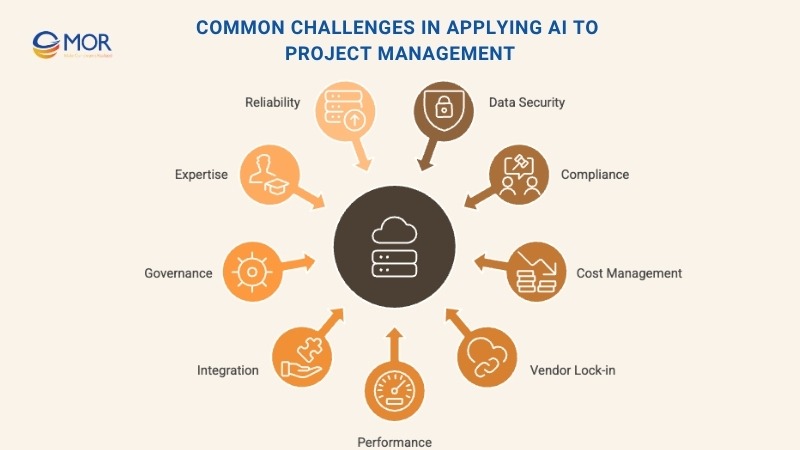
How To Implement AI In Your Project Management Workflow
Integrating AI in project management requires a structured, step-by-step approach. Done right, it improves productivity, decision-making, and overall project visibility. The goal isn’t to replace human control but to make daily operations more intelligent and responsive. Here’s how teams can bring AI into their workflows effectively, whether they’re starting from scratch or enhancing existing systems.
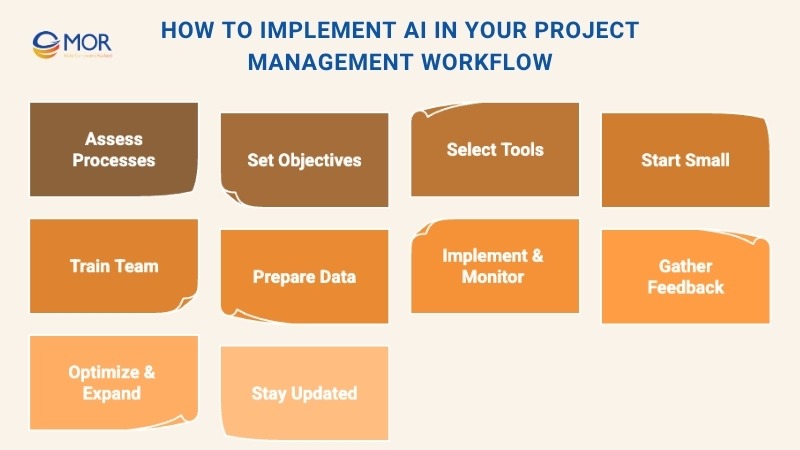
- Assess Current Processes: Begin by analyzing how your projects are currently managed. Identify repetitive, manual, or time-consuming tasks, like scheduling, reporting, or risk tracking, that could benefit from automation. This helps define where AI can deliver immediate value.
- Set Clear Objectives: Define what success looks like for your AI adoption. Align these goals with your larger business and project management strategy to ensure every initiative supports measurable outcomes.
- Select The Right AI Tools: Choose solutions that fit your workflow and integrate easily with your current software. Look for AI in project management courses or vendor resources that help your team understand tool capabilities and best practices before rollout.
- Start Small: Test AI through a pilot project or within a single department first. A small-scale start minimizes risk and helps measure impact before organization-wide deployment.
- Train Your Team: Equip your staff with the knowledge to use AI confidently. Offer hands-on training and continuous learning sessions focused on both the tools and the elements of AI, like data inputs, algorithms, and automation logic.
- Collect And Prepare Data: AI thrives on clean, well-structured data. Compile historical project information, remove duplicates, and ensure consistency. Quality data is the foundation of reliable predictions and accurate insights.
- Implement And Monitor: Roll out your selected tools gradually and track performance through analytics dashboards. Measure time saved, errors reduced, and workflow improvements to confirm the impact of AI-based project management tools.
- Gather Feedback: Involve team members throughout the process. Collect their feedback regularly to fine-tune AI behavior, fix integration issues, and maintain usability across departments.
- Optimize And Expand: After seeing results from your pilot, scale AI use across more teams and workflows. Adjust your configurations to handle complex projects or larger datasets as you grow.
- Stay Updated: AI technology evolves fast. Keep track of new advancements, updates, and integrations that can improve accuracy and functionality. Regularly review system performance to maintain long-term success within your AI project cycle.
The Future Of AI In Project Management
According to Harvard Business Review, only about 35% of business projects are successfully completed, often due to the limitations of traditional management tools. As organizations handle larger volumes of data and increasingly complex workflows, these older systems struggle to keep up with modern demands.
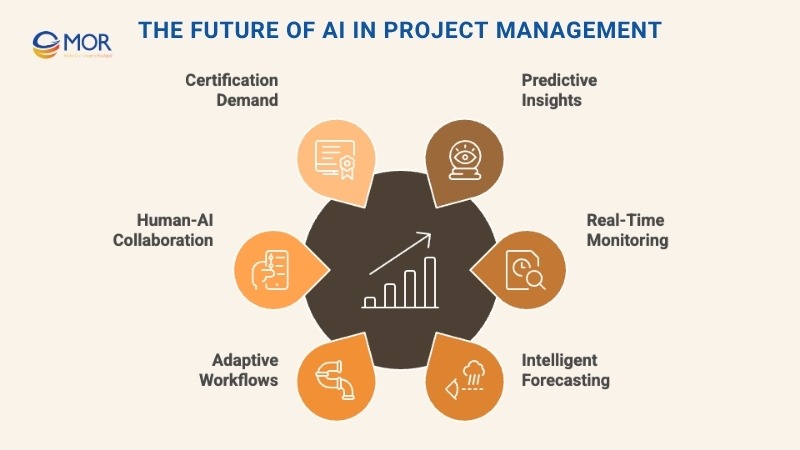
That’s quickly changing with AI in project management. Intelligent platforms are making it possible for managers to monitor every phase of a project in real time, from progress and performance to risk and resource allocation. Future AI systems will not only track outcomes but also forecast benefits, compliance levels, and stakeholder satisfaction with remarkable precision.
This evolution marks a shift toward truly predictive and adaptive project management, where data, automation, and human expertise work together seamlessly. As more professionals pursue project management AI certification and companies continue to integrate smarter tools, AI will become the foundation of how projects are planned, executed, and measured in the years ahead.
Enhance AI In Project Management With MOR Software
AI has become a driving force behind smarter, faster, and more reliable project management. But true transformation happens when technology meets expertise and that’s where we come in.
At MOR Software, we help organizations harness AI in project management to turn complex workflows into clear, data-backed operations. Our team builds intelligent solutions that automate scheduling, monitor risks, predict outcomes, and optimize resources with precision. From concept to deployment, every AI-driven feature we deliver is designed to make project execution smoother, faster, and more accurate.
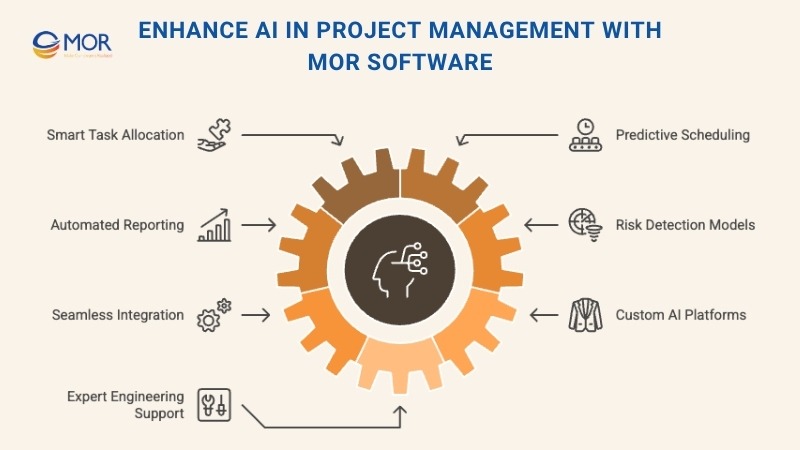
We integrate AI capabilities into existing project management systems or develop custom platforms that align with your business goals. Whether it’s automating repetitive tasks, analyzing performance data, or forecasting delivery timelines, our engineers create tools that free your team to focus on strategic decisions.
What sets our approach apart is how we blend AI models with real-world project insights. We don’t just apply algorithms, we fine-tune them for your workflow. This ensures each project benefits from predictive analytics, smart automation, and continuous optimization.
Our AI-driven project management solutions can include:
- Smart task allocation based on skill, availability, and workload balance.
- Predictive scheduling to prevent delays and improve delivery accuracy.
- Automated reporting and dashboards tailored to your KPIs.
- Risk detection models that learn from past data to flag potential issues.
- Seamless integration with platforms like Salesforce, Jira, or Microsoft Teams.
As a leading software development company in Vietnam, we bring together advanced technology, proven methodologies, and a dedicated team of AI specialists to help you manage projects with confidence.
Ready to move beyond manual management and embrace a smarter way to lead projects?
Contact us to discover how our AI-powered solutions can elevate your project management efficiency and decision-making.
Conclusion
As businesses grow more complex, AI in project management is no longer optional, it’s essential for staying competitive. The right AI tools can turn data into direction, automate tedious tasks, and give teams the clarity to make better decisions faster. At MOR Software, we combine technology and expertise to help you manage projects with confidence and precision. Contact us today to explore how AI can transform your project management strategy.
Rate this article
0
over 5.0 based on 0 reviews
Your rating on this news:
Name
*Email
*Write your comment
*Send your comment
1